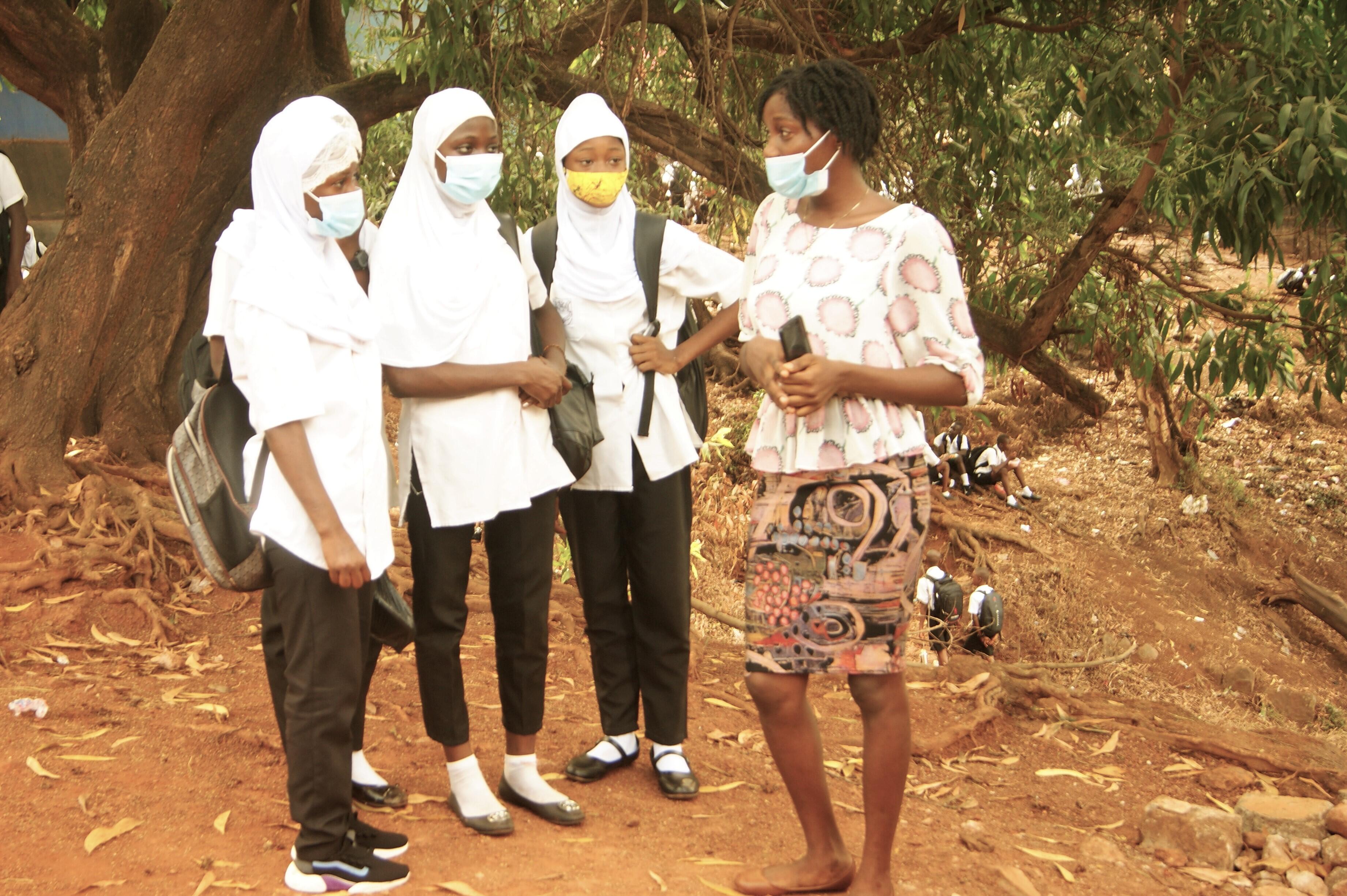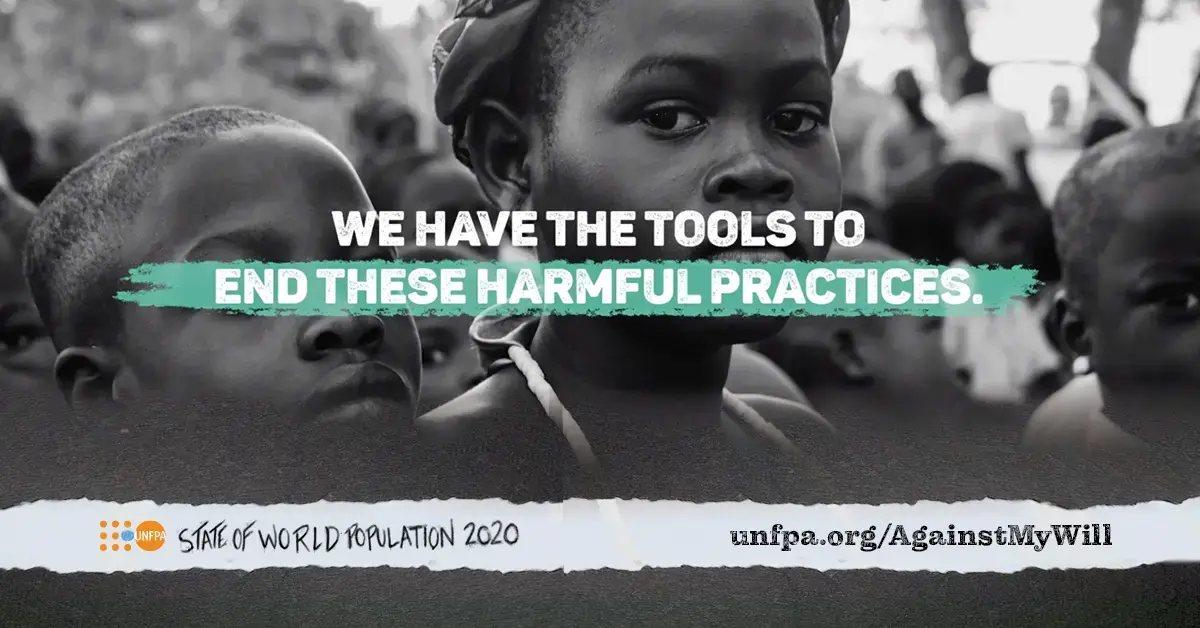FREETOWN, Sierra Leone, 3 December 2020: As one of 10 children, Fatmata Kamassie endured her parents’ separation when she was a child. “We lived in Koidu town but our life was so challenging because we could barely afford food to eat,” said Fatmata. When Fatmata was 10, she and her family moved to Bamba village, in Kono district, in search of better economic opportunities. “My aunt wasn’t happy with my mum’s decision to move. She convinced my mum that I needed to return to Kono and stay with her, since I was bright and needed to be educated,” said Fatmata.
Now 21, Fatmata said that growing up she personally experienced sexual harassment, physical violence and pressure to be initiated into the Bondo society (an all-female secret society). The Bondo initiations included Female Genital Mutilation (FGM), which is considered a rite of passage and a training ground to prepare young girls for adulthood. “I came from a cultural background that believes if a girl is not cut, she will grow up without bearing children,” revealed Fatmata.
FGM is a practice that involves altering or injuring the female genitalia for non-medical reasons, and is internationally recognized as a human rights violation. Globally, it is estimated that some 200 million girls and women today have undergone some form of FGM. According to the 2019 SLDHS, 83 per cent of women aged 15–49 have undergone FGM.
In 2016, when Fatmata was 17 years old, she attended a National Girls’ Camp organized by the former First Lady, Sia Koroma, and supported by the UNFPA. The camp provided girls aged 10–19 with information about their rights and responsibilities, equipped them with knowledge on life skills and also encouraged social activism among them. “The UNFPA facilitator at the time told us that no one should force us to undergo FGM or any other form of gender-based violence, and that we have the right to say no, even if we are children,” explained Fatmata.
Three years after attending the National Girls’ Camp, Fatmata’s aunt again “Was forcing me to get cut. I refused to stay silent and I asked people to intervene,” said Fatmata. As the only girl in her community to have not undergone FGM, Fatmata’s friends and neighbours teased her continuously. Her aunt also became hostile towards her because Fatmata had asked outsiders to get involved. When she realized that her relatives kept on pressuring her about being cut, she ran away from home and travelled to Freetown, Sierra Leone’s capital.
Whilst in Freetown, Fatmata lived with an older sister. “I survived by helping my sister to sell yogurt and bottled water,” she said. Sixteen months later, Fatmata became an advocate against FGM and the co-founder of Uncut Gems Sierra Leone, a girls’ advocacy group that works on ending the practice of FGM and other forms of GBV against women and girls in Kono District. She is also a member of Karo Kura Youth Advisory Panel at the NGO Purposeful which is involved in supporting youth-led groups in receiving funding through a participatory grant making scheme.
Being fully committed to the cause, Fatmata is also a member of the Youth Advisory Panel established by the National Secretariat for the Reduction of Teenage Pregnancy with funding from Irish Aid and supported by UNFPA. The youth advisory panel aims to empower young people, especially girls, by encouraging them and people in their communities to invest in girls’ education as a way to improve the lives of both the girls and their communities.
“Working as a Youth Champion in the district of Kono, I advocate for youth empowerment and participation in decision-making processes at all levels. I organize community outreach programmes such as community engagements, meetings and mentorship for girls, informing them about how best to protect and prevent them from being victims of teenage pregnancy, child marriage, and how to report cases of domestic violence, bullying, sexual harassment among other issues,” explained Fatmata.
“I chose to go back home to Kono with my work because I had escaped trying to avoid being cut, and there was no one in my community to support me. I had to come to Freetown to get the support I needed and I returned to Kono to give support to other girls,” added Fatmata. She had broken barriers for herself and other girls by including young people's voices on national polices relating to teenage pregnancy, FGM and child marriage.
Inspired by her own struggle to keep on improving, Fatmata is convinced that through her advocacy against FGM and other forms of GBV, she will make a lasting impact on her society. “I have been campaigning against gender-based violence through various social media platforms. There are girls who never knew about the adverse effects of FGM, but are now equipped with vital information through my advocacy. I have people who have been cut now asking to join my advocacy group against FGM.”
“l am proud to be a girl. I believe in the spirit of change and love for humanity. I will work towards stopping all forms of recrimination and to empower girls to speak out with confidence whenever they are faced with any form of violence,” said Fatmata proudly. “To any girl under threat of being cut, I would tell them, say no to FGM!”
###
About the United Nations Population Fund
UNFPA is the United Nations sexual and reproductive health agency. Our mission is to deliver a world where every pregnancy is wanted, every childbirth is safe and every young person's potential is fulfilled.
For more information, please contact:
Angelique Reid, UNFPA Sierra Leone, Communication Specialist
Email: areid@unfpa.org
John Baimba Sesay, UNFPA Sierra Leone, Web and Media Analyst
Email: jsesay@unfpa.org Tel: +232 30953193/ +23279369395




